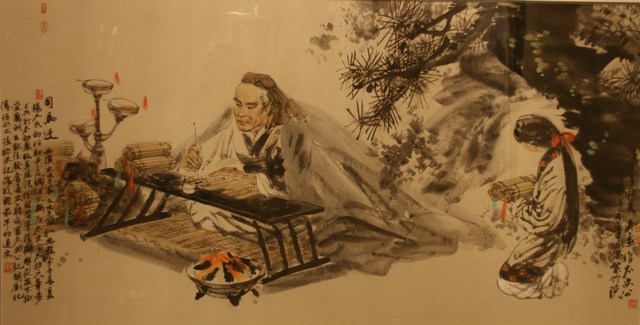 
The Yanyu Herb and the
Greedy Dragon
Compiled by Lai Cenglin
In Qutang Gorge in Sichuan stood the towering Chijia Mountain, with a
cliff fiery red as if hewn out by choppers and knives. It was also
called Peach Mountain; this was because it had a peak the shape of a big
peach sitting on a huge jade plate formed by clouds circling around it.
A cave below the peach, deep and unfathomable, where stalactites hung
down and quaint stones jutted from the ground, was called Seven Gates
for the number of gates it had. It was a deserted place frequented by
beasts of prey. One day a fisherman called Xia Zhongjiao, fleeing from
famine and finding refuge here, chased away the animals and settled down
at Seven Gates. Making a living by fishing, Xia planted herbs on Yanyu
Shoal in the Kuimen River, herbs which brought the dying back to life.
He often cured the fishermen living along the Three Gorges of the
Yangtze River with the Yanyu herb.
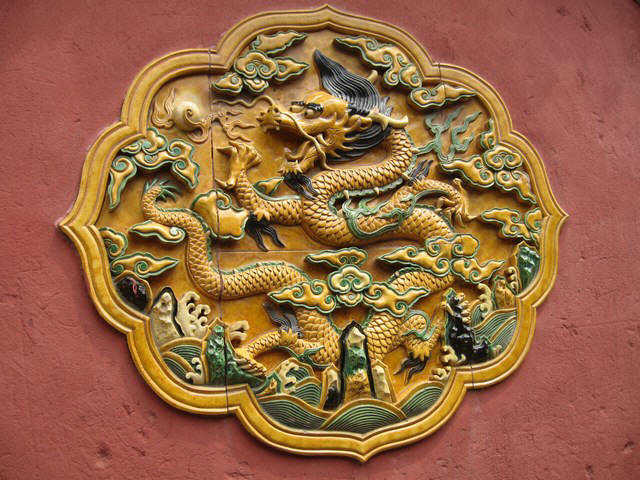 One
day a dragon which had been locked up by Yu the Great in
Dragon-Confinement Cave under Yanyu Shoal when Yu harnesses the water
thousands of years ago slipped out of a ring confining it to the cave.
With a wish of its tail it wiped away all the Yanyu herbs. When Xia
returned from fishing one day to pick some herbs, he found them all gone.
He was wondering what had happened when suddenly a wind arose and waves
began to roll. With a crash of thunder, a single-horned dragon emerged
from under Yanyu Shoal. Realizing it was the dragon people had told him
about, he demanded fearlessly: "Did you take my herbs, you impertinent
dragon?" One
day a dragon which had been locked up by Yu the Great in
Dragon-Confinement Cave under Yanyu Shoal when Yu harnesses the water
thousands of years ago slipped out of a ring confining it to the cave.
With a wish of its tail it wiped away all the Yanyu herbs. When Xia
returned from fishing one day to pick some herbs, he found them all gone.
He was wondering what had happened when suddenly a wind arose and waves
began to roll. With a crash of thunder, a single-horned dragon emerged
from under Yanyu Shoal. Realizing it was the dragon people had told him
about, he demanded fearlessly: "Did you take my herbs, you impertinent
dragon?"
"What if I did?" sneered the dragon. "I want to take you too. Yu the
Great locked me up for thousands of years. I'm hungry. I'll make you my
first meal."
The dragon raised its claw and made for Xia Zhongjiao, who jumped
into the rolling waves and fought the dragon with his fish trident for
three days and nights. On the fourth day, the aging Xia Zhongjiao, his
strength failing because of hunger and fatigue, was finally gobbled up
by the dragon.
Xia's old wife, overcome with grief at the news of his death, exhorted
her son to train himself in aquatic skills in order to avenge his father
when he grew up.
Determined to avenge his father, Xia Xiaojiao trained hard while fishing
to support his mother. After a few years, he became as tall and stout as
his father, and was able to tread water fiercely, submerge for seven
days and nights and fight with a fish trident. One day, coming home from
fishing, he became anxious at not seeing his mother coming out to meet
him. He went home only to see his mother at her last breath. He was just
going to fetch a doctor when his mother tugged at his sleeve and
told him in a laboured voice: "I can only be saved by the Yanyu herb
your father grew, my son."
New hatred added to his old grudge. Xiaojiao took leave of his mother.
Fish trident in hand, he made for Yanyu Shoal, where he shouted at the
top of his voice:"Listen to me, you greedy dragon. Give me the magic
Yanyu herb or I'll cut you in pieces."
With a crash of thunder the dragon emerged from its cave and gloated: "Good,
you'll be my next meal." He swooped down on Xia Xiaojiao who, with a
movement quick as lightening, stuck his fish trident into the stomach of
the greedy dragon, bringing out a spurt of black blood.
The dragon, fiercer because of the wound, fought the young man who was
the braver for his hatred. After seven days and nights, the dragon,
weakened by loss of blood, turned and fled into its cave. It slammed the
door with a swish of its tail. No matter how Xiaojiao rammed the door,
breaking his trident in his effort, he could not open it. At his wits'
end, he had to go home. Finding his mother deteriorating, he thought
hard about a way to open the stone door of the dragon's cave.
At midnight, Xiaojiao saw in his dreams an old man emerging from the
peach peak of Chijia Mountain, riding a cluster of clouds and holding a
golden book in his hand. "You are a brave young fisherman who has lived
up to your mother's expectations, Xiaojiao. Take this book and read Yu
the Great's tactics for subduing a dragon.
Xiaojiao accepted the book. "Who are you, granddad?" he asked.
"" I'm your neighbour, Sage Peach. The book only tells you a few
treasures. It is your wit and courage and the skill in using these
treasures that will help you." After saying this, the old man stepped on
to the cluster of clouds and floated away.
Awakened by the cocks' crowing, Xiaojiao rubbed his eyes and,
remembering his dream, saw in his hands a golden book. He lit a pine
torch and read it, keeping in mind what was said in the book. Without
waiting for daybreak to bid his mother goodbye, he jumped into the river
and came to the dragon's cave under Yanyu Shoal, where he moved away a
slab of stone and produced a stone cap, which he put on his head.
The cave door gave way at the first blow of his stone hat. He groped in
the pitch-dark cave, unable to see a thing until he found a stone box.
From it he produced a pair of stone boots. When he stepped into them,
the boots carried him to the second door, inside which was a stone horse.
At sight of Xiaojiao, the horse pricked up its ears and neighed.
Xiaojiao pulled two swords out of its ears and their glittering cool
light saw the characters "Yu the Great's Sword" on the hilts. Then the
stone boots carried him to the third door, behind which the greedy
dragon rested on a stone platform.
Opening its eyes and seeing Xiaojiao, the dragon leapt up, defending the
platform from Xiaojiao. His swords were too short to reach the dragon on
the platform, but Xiaojiao came up with an idea. He pretended to retreat.
The dragon at once chased after him, not wanting to give up this
delicious morsel. Xiaojiao halted abruptly, leapt onto the stone
platform, raised his swords, slashed the platform open and discovered a
ring. He tossed the ring over the dragon's head, confining it to the
cave. Behind the platform he found the Yanyu herb. On his way out he
took three stone padlocks from the stone horse's back and locked the
three doors with them. The greedy dragon could not come out to harm
people anymore.
Xiaojiao returned home with the Yanyu herb. As a day in the dragon's
cave equals a year on land, when he arrived home, his mother had been
dead for a long time. He buried his mother and planted the Yanyu herb
and, like his father, treated the fishermen all his life.
-------------------------------------------------------------------------------------------------------------------
up
-------------------------------------------------------------------
The story of
the dog
A story of the
Mosuo people, who have lived in the remote lower reaches of the Tibetan
plateau for more than 1,500 years...)
A long, long time ago, people and animals lived forever.
But as eternity went on, there were more and more people and animals and
less and less room for them to sleep and play, and less and less food
for them to eat. So the animals and the people began to squabble and
fight and eventually made so much noise that the Great Heaven could not
stand it anymore.
The Great Heaven called all the animals together and told them that it
had found a solution. From now on, aside from the goddesses and the gods,
no one on the earth could live forever. Instead, every being was to have
a mortal life, which meant that at the end of it, they would die. The
Great Heaven, who did not want the responsibility of allocating life
spans, had decided to call out a number of years and to leave it up to
each animal to call back in response.
When the Great Heaven called one thousand years, the Wild Goose answered:
'Yes! Me!' And when the Great Heaven called one hundred years, the Wild
Duck answered: 'Yes! Me!' And when the Great Heaven called out sixty
years, the Dog said: 'Yes!' But the Human Being was so slow and clumsy
that it was left with only thirteen years.
Sorely disappointed at the prospect of such a short life, the Human
Being went to complain to the Great Heaven. But the Great Heaven was not
interested in complaints and suggested that the Human Being try to sort
out its problems with the other animals. So the Human Being went
pleading to all the animals, begging them to take its thirteen years in
exchange for their own life span. Not surprisingly, no one was
interested - until the Human Being asked the Dog, who agreed just
because dogs have always loved people. But now the Human Being was so
grateful that it promised to take care of the Dog forever. And this is
why, every New Year's Eve, dogs are given a full human meal, in
remembrance of the Dog's sacrifice.
From 'Leaving
Mother Lake', by Namu and Christine Mathieu

-------------------------------------------------------------------------------------------------------------------
up
-------------------------------------------------------------------
Her husband's
Mistress
Lin Ruqiu
Meiwen climbed haltingly to the seventh floor step by step with a bunch
of vegetables in hand.
She had overworked herself in the past few days. Her husband's aunt's
family had come to visit them from Singapore, so all day long she had
busied herself cooking delicious food for them, boiling, frying, and
stewing. As the common saying goes 'The host is at peace only when the
guests are gone'. Meiwen had some time for herself only after their
relatives left last night. This morning, she slept in before she started
to tidy things up. After that she went to the market to buy her water
spinach.
Eventually, Meiwen got to the topfloor and soon found herself inside her
apartment. She had just changed to her slippers when a stranger shot out
of her bedroom. Dressed in the latest fashion, the stranger had the
classic beauty of an attractive woman: Peach-like cheeks and
almond-shaped eyes. In shock, Meiwen was about to ask who she was and
how she got into her home, when the stranger confronted her, seized her
collar and roared, "So you are Yu Meiwen, aren't you? There you are!
Your husband is a liar after all. He told me he is not married and
wanted to marry me. I wanted to come and see his home several times, but
he always had an excuse to keep me away. What an unfaithfull man! He is
married, but he has been looking for mistressess and hides everything
from his wife. Indeed, you can see a man's face, but never his heart.
That bastard has cheated me!"After shooting off a series of accusations,
she burst out crying.
It struck Meiwen like a heavy blow; she almost collapsed. What was going
on? She had been married to Xiaohua for two years, and there was nothing
out of the ordinary about their marriage. The only thing suspicious, if
anything, was that Xiaohus had seldom returned home before midnight
lately. He told her he had so much to do that he could not finish it
during regular work hours. 'You can't see someone's heart after all',
the popular saying goes. 'A useless man keeps only one wife; a capable
man changes mistresses every night.' Has it really come true? Meiwen's
jealousy started to burn inside her. Pushing away the stranger, she
shouted: "Where are you from? I shall take him to ask when he comes
home!"
"Why worry about where I come from?", said the woman, whiping her tears.
"If he hadn't got me with child, I wouldn't have been able to steal his
keys. And why would I have come here in such a hurry, anyway? I hear he
has two more girlfriends. That's why I became more careful. If I hadn't
seen your wedding picture, I wouldn't have known you were married." With
this she burst into wails again.
"What? He has two more girlfriends?" To Meiwen, this was like adding oil
to the fire. "This faithless man has gone too far! No wonder he didn't
try to entertain his aunt when she was visiting us. Instead, he was
indulging himself with those women! That is why..." Meiwen was so
furious that she did not know how to vent her anger. She gnashed her
teeth, cold sweat oozing from her palms.
The strange woman continued to sob by herself. "This cheater Xiaohua has
ruined - ruined my life. That son of a bitch, what am I going to do now?"
Seeing her weeping in uninterrupted choking sobs, Meiwen felt somewhat
sorry for her. She drew out a tissue and gave it to her. "Here, wipe
your face first. I'll get you another hot towel."With this, she walked
into her bathroom.
"Never mind, Meiwen. I really appreciate it. I'm leaving now. Just don't
tell Xiaohua I have been here when you see him, please."
Meiwen heard every single word clearly from the bathroom. Unable to make
up her mind, she was wondering whether she should ask her to stay or see
her off.
- Bang. She heard the door slam.
The strange woman had gone. The angry Meiwen walked out of the bathroom.
Greatly confused, she walked several circles in the living room until
she clenched her teeth and uttered in hostility: "That faithless man. I
will choke him to death when he comes back!"
At noon Xiaohua finallt returned home. He entered the apartment only to
hear Meiwen shout: "You faithless man!" and charge at him grabbing for
his neck.
Het tried to push her away as he shouted: "What are you doing, Meiwen?"
"What am I doing?" laughed Meiwen bitterly. "You keep several mistresses
outside, and you think I don't know it!"
He denied it resolutely.
"You don't have to swear to heaven or God; you got her pregnant and she
came just now. You still want to deny it?"
After all, women are no match for men. After a fierce fight, Xiaohua
managed to conquer her. Meiwen wept and wailed in the sofa, and the
infuriated Xiaohua started to smash cups on the floor. Their neighbours
who heard their fight came to knock on the door to find out what was
happening, but Xiaohua only told them from behind the door:"Nothing, I
just broke two cups accidentally."
After their neighbours left, the couple started a cold war. The sulky
Xiaohua buried himself in smoking until he suddenly thought of something.
"Did that woman get into our apartment by herself? Or did you open the
door for her?"
"If she hadn't stolen your keys from your pocket, how could she have got
in here?" said the unfriendly Meiwen.
Hearing this, Xiaohua dashed into the bedroom without saying another
word. He opened two drawers in one breath. "Where are the five thousand
Singapore dollars and the gold necklace and bracelet my aunt gave us?"he
shouted after a moment of frantic searching. "Where did you put them?"
"What?" Meiwen screamed as she felt fear on her head. She ran into the
bedroom and started turning over the things in the left drawer and the
right drawer. Then she pounded the dressing table with her fist and
howled. "That goddamned thief! What a cunning and vicious woman she is."
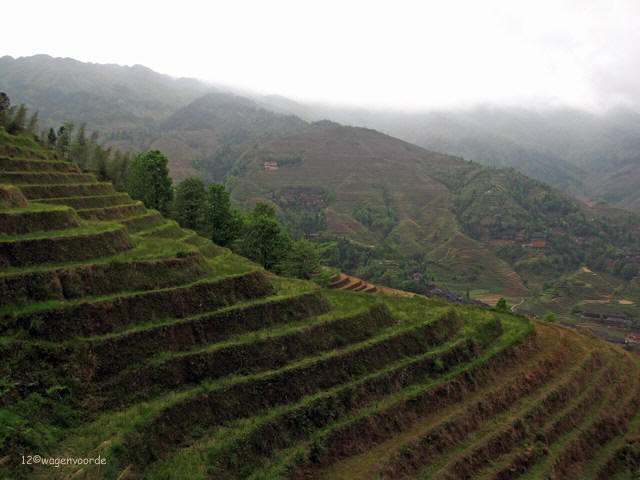
-------------------------------------------------------------------------------------------------------------------
up
-------------------------------------------------------------------
Nearly said
by Gao Weixi
Melancholy emerged in my mind as if it were a ghost. Day after day I
tried to shake it off, but it clung to my heart; I tried to kick it out,
yet it lingered in my soul. It seemed as if it would accompany me
throughout my life. I was lost in astonishment - what had happened?
In the barracks, men always outnumbered women. Beautiful as a rose, you
had a slender figure with a tender temperament, just like a phoenix
standing in a flock of chickens - a rare treasure. Many eyes
stared at you with admiration. There was that short section director who
would stand by you whenever we had to line up, whether it was morning
drill, meal time or evening roll call. Everybody felt surprised but your
generosity allowed you to ignore everything, treating him with courtesy.
Perhaps he had somebody bragging to you about him - a tall, big man
often came to visit you openly. I did not take it to heart when I first
saw you two sitting on a tricycle heading for town, but soon I sensed
something wrong there. Some said he exploited the crisis of a
relationship; other said you invited a wolf to your house.
By chance I once saw his coquettish look almost sparking a line of
self-conceit in you. Then I thought, perhaps you really had made your
choice.
You and I were only colleagues in language teaching, that's all. We
might have more common conversation topics. We did often have little
disputes over Confucius, the literary merits and blemishes of Pushkin
and Chekhov, and the importance of Sherlock Holmes's detective stories
in literary history. But those were just academic issues, weren't they?
At dusk in May, the pomegranate blossoms were bright as fire. I leaned
against the tree trunk as you sat on the fork, opened your red lips, and
in a low voice began to sing the Song of Mei Niang. When you
finished singing, we were lost in silence. We each embraced the evening
wind, and did not want to leave. Then what did I decipher from the
dancing freckles of moonlight on your face which crept through the
flowers when the moon appeared in the east? It was a poem written
without words. It was a three-dimensional picture. It was holy teaching
that exposed human secrets. My heart began to tremble.
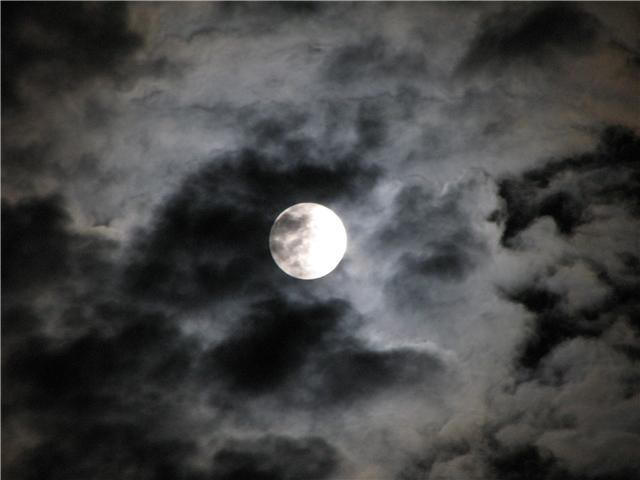 Then
it was another May, when the earth was covered with pomegranate blossoms
again. Our old wounds had just healed, but we ran into eachother again.
You whispered to me when nobody was around:"Everything's been
pre-arranged. I never knew I should marry him." Didn't your words spoil
the scenery? "What do you mean?", I asked. You looked down, lost in
thought for a moment. Instead of answering me, you gave a sad smile and
tripped away, leaving behind a lifetime mystery. Then
it was another May, when the earth was covered with pomegranate blossoms
again. Our old wounds had just healed, but we ran into eachother again.
You whispered to me when nobody was around:"Everything's been
pre-arranged. I never knew I should marry him." Didn't your words spoil
the scenery? "What do you mean?", I asked. You looked down, lost in
thought for a moment. Instead of answering me, you gave a sad smile and
tripped away, leaving behind a lifetime mystery.
Always dim and vague, now visible, now invisible, you never faded in my
mind during those long years. In May when petals fell in riotous
profusion, I often walked back and forth under the tree, cherishing that
little feeling you had left in me, picking up the fallen leaves and
chewing on the days that had passed. Using that drifting train of
thought, I tried but never succeeded to draw your clear figure: It was
always like one drawn in water - once you wiped it, it was gone. Yet
just like a spirit lingering around, momentarily you would appear in my
mind again. As our ancestors said, hardly had I closed my eyes when I saw
you again.
May God be our witness: We never said or did anything that lovers would
have done. Perhaps because of this, it invites more guessing and
provokes more thinking. And probably because of that, our relationship
has reached such a lasting state that it takes shape after our thinking
and creates kindred spirits. It was God's will that this piece of blank
paper be created, ready for a most beautiful and ingenious human picture
to be painted by a clever hand, brushes, paints and ink lying by, ready
for use.
The last words I heard from you were forwarded to me by another person:
"Tell him I wish him good luck." You asked someone to forward your
message even though today's means of communication are so advanced that
nobody really needs anyone's assistance. May I ask, you cunning woman,
what are you really up to? What message do you invent to convey?
You wanted to say it, but you did not. You wanted to say it, but you
never did! It seems you just wanted to create a broken relationship that
is not totally broken. Several decades have flown by. Indeed, it is that
'last wish', like gossamer, now drifting away, now clinging around me,
that has been resounding in my ears up till today.
I was told that you still live in my remote home city. Human feelings
change, day in, day out. Time can turn out tragedies, but wonders more
so. I sincerely hope that you live better than I do. I am sure you do!
-------------------------------------------------------------------------------------------------------------------
up
-------------------------------------------------------------------
Franz Kafka:
The Great
Wall of China
(a long short story)
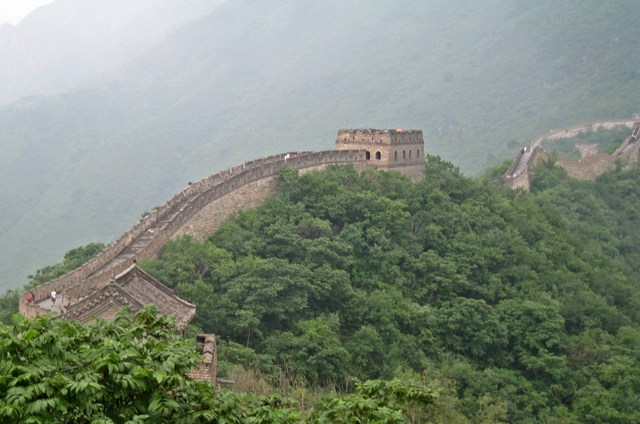
Great Wall of
China, near Beijing,
(Copyright ©Foto: alywagenvoorde, 2006)
The
Great Wall of China was finished at its northernmost location. The
construction work moved up from the south-east and south-west and joined
at this point. The system of building in sections was also followed on
a small scale within the two great armies of workers, the eastern and
western. It was carried out in the following manner: groups of about
twenty workers were formed, each of which had to take on a section of
the wall, about five hundred metres. A neighbouring group then built a
wall of similar length to meet it. But afterwards, when the sections
were fully joined, construction was not continued on any further at the
end of this thousand-metre section. Instead the groups of workers were
shipped off again to build the wall in completely different regions.
Naturally, with this method many large gaps arose, which were filled in
only gradually and slowly, many of them not until after it had already
been reported that the building of the wall was complete. In fact,
there are said to be gaps which have never been built in at all,
although that’s merely an assertion which probably belongs among the
many legends which have arisen about the structure and which, for
individual people at least, are impossible to prove with their own eyes
and according to their own standards, because the structure is so
immense.
Now, at first one might think it would have been more advantageous
in every way to build in continuous sections or at least continuously
within two main sections. For the wall was conceived as a protection
against the people of the north, as was commonly announced and
universally known. But how can protection be provided by a wall which
is not built continuously? In fact, not only can such a wall not
protect, but the structure itself is in constant danger. Those parts of
the wall left standing abandoned in particular regions could easily be
destroyed again and again by the nomads, especially by those back then
who, worried about the building of the wall, changed their place of
residence with incredible speed, like grasshoppers, and thus perhaps had
an even better overall view of how the construction was proceeding than
we did, the people who built it.
However, there was no other way to carry out the construction except the
way it happened. In order to understand this, one must consider the
following: the wall was to be a protection for centuries; thus, the
essential prerequisites for the work were the most careful construction,
the use of the architectural wisdom of all known ages and peoples, and
an enduring sense of personal responsibility in the builders. Of course,
for the more humble tasks one could use ignorant day labourers from the
people—the men, women, and children who offered their services for good
money. But the supervision of even four day labourers required a
knowledgeable man, an educated expert in construction, someone who was
capable of feeling sympathy deep in his heart for what was at stake here.
And the higher the challenge, the greater the demands. And such men
were in fact available—if not the crowds of them which this construction
could have used, at least in great numbers.
They did not set about this task recklessly. Fifty years before the start
of construction it was announced throughout the whole region of China
which was to be enclosed within the wall that architecture and
especially masonry were the most important areas of knowledge, and
everything else was recognized only to the extent that it had some
relationship to those. I still remember very well how as small children
who could hardly walk we stood in our teacher’s little garden and had to
construct a sort of wall out of pebbles, and how the teacher gathered up
his coat and ran against the wall, naturally making everything collapse,
and then scolded us so much for the weakness of our construction that we
ran off in all directions howling to our parents. A tiny incident, but
an indication of the spirit of the times.
I was lucky that at twenty years of age, when I passed the final
examination of the lowest school, the construction of the wall was just
starting. I say lucky because many who earlier had attained the highest
limit of education available to them for years had no idea what to do
with their knowledge and wandered around uselessly, with the most
splendid architectural plans in their heads, and a great many of them
just went downhill from there. But the ones who finally got to work as
supervisors on the construction, even if they had the lowest rank, were
really worthy of their position. They were masons who had given much
thought to the construction and never stopped thinking about it, men who,
right from the first stone which they sunk into the ground, had a sense
of themselves as part of the wall. Such masons, of course, were driven
not only by the desire to carry out the work as thoroughly as possible
but also by impatience to see the structure standing there in its
complete final perfection. Day labourers do not experience this
impatience. They are driven only by their pay. The higher supervisors
and, indeed, even the middle supervisors, see enough from their various
perspectives on the growth of the wall to keep their spirits energized.
But the subordinate supervisors, men who were mentally far above their
small, more trivial tasks, had to be catered to in other ways. One
could not, for example, let them lay one building block on top of
another in an uninhabited region of the mountains, hundreds of miles
from their homes, for months or even years at a time. The hopelessness
of such a hard task, which could not be completed even in a long human
lifetime, would have caused them distress and, more than anything else,
made them worthless for work. For that reason they chose the system of
building in sections. Five hundred metres could be completed in
something like five years, by which time naturally the supervisors were
as a rule too exhausted and had lost all faith in themselves, in the
building, and in the world.
Thus, while they were still experiencing the elation of the celebrations
for the joining up of a thousand metres of the wall, they were shipped
far, far away. On their journey they saw here and there finished
sections of the wall rising up; they passed through the quarters of the
higher administrators, who gave them gifts as badges of honour, and they
heard the rejoicing of new armies of workers streaming past them out of
the depths of the land, saw forests being laid low, wood designated as
scaffolding for the wall, witnessed mountains being broken up into rocks
for the wall, and heard in the holy places the hymns of the pious
praying for the construction to be finished. All this calmed their
impatience. The quiet life of home, where they spent some time,
reinvigorated them. The high regard which all those doing the building
enjoyed, the devout humility with which people listened to their
reports, the trust that simple quiet citizens had that the wall would be
completed someday—all this tuned the strings of their souls. Then, like
eternally hopeful children, they took leave of their home. The
enthusiasm for labouring once again at the people’s work became
irresistible. They set out from their houses earlier than necessary,
and half the village accompanied them for a long way. On all the roads
there were groups of people, pennants, banners—they had never seen how
great and rich and beautiful and endearing their country was. Every
countryman was a brother for whom they were building a protective wall
and who would thank him with everything he had and was for all his life.
Unity! Unity! Shoulder to shoulder, a coordinated movement of the people,
their blood no longer confined in the limited circulation of the body
but rolling sweetly and yet still returning through the infinite extent
of China.
In view of all this, the system of piecemeal building becomes
understandable. But there were still other reasons, too. And there is
nothing strange in the fact that I have held off on this point for so
long. It is the central issue in the whole construction of the wall, no
matter how unimportant it appears at first. If I want to convey the
ideas and experiences of that time and make them intelligible, I cannot
probe deeply enough into this particular question.
First, one must realize that at that time certain achievements
were brought to fruition which rank only slightly behind the Tower of
Babel, although in the pleasure they gave to God, at least by human
reckoning, they made an impression exactly the opposite of that
structure. I mention this because at the time construction was
beginning a scholar wrote a book in which he drew this comparison very
precisely. In it he tried to show that the Tower of Babel had failed to
attain its goal not for the reasons commonly asserted, or at least that
the most important cause was not among these well-known ones. He not
only based his proofs on texts and reports, but also claimed to have
carried out personal inspections of the location and thus to have found
that the structure collapsed and had to collapse because of the weakness
of its foundation. And it is true that in this respect our age was far
superior to that one long ago. Almost every educated person in our age
was a mason by profession and infallible when it came to the business of
laying foundations.
But it was not at all the scholar’s aim to prove this. He claimed that
the great wall alone would for the first time in the age of human beings
create a secure foundation for a new Tower of Babel. So first the wall
and then the tower. In those days the book was in everyone’s hands, but
I confess that even today I do not understand exactly how he imagined
this tower. How could the wall, which never once took the form of a
circle but only a sort of quarter or half circle, provide the foundation
for a tower? But it could be meant only in a spiritual sense. But then
why the wall, which was still something real, a product of the efforts
and lives of hundreds of thousands of people? And why were there plans
in the book—admittedly hazy plans—sketching the tower, as well as
detailed proposals about how the energies of the people could be
channelled into powerfully new work.
There was a great deal of mental confusion at the time—his book is only
one example—perhaps simply because so many people were trying as hard as
they could to join together for a single purpose. Human nature, which
is fundamentally careless and by nature like the whirling dust, endures
no restraint. If it restricts itself, it will soon begin to shake the
restraints madly and tear up walls, chains, and even itself all over the
place.
It is possible that even these considerations, which argued
against building the wall in the first place, were not ignored by the
leadership when they decided on piecemeal construction. We—and here I’m
really speaking on behalf of many—actually first found out about it by
spelling out the orders from the highest levels of management and
learned for ourselves that without the leadership neither our school
learning nor our human understanding would have been adequate for the
small position we had within the enormous totality.
In the office of the leadership—where it was and who sat there no
one I asked knows or knew—in this office I imagine that all human
thoughts and wishes revolve in a circle, and all human aims and
fulfilments in a circle going in the opposite direction. And through
the window the reflection of the divine worlds fell onto the hands of
the leadership as they drew up the plans. And for this reason the
incorruptible observer will reject the notion that if the leadership had
seriously wanted a continuous construction of the wall, they would not
have been able to overcome the difficulties standing in the way. So the
only conclusion left is that the leadership deliberately chose piecemeal
construction. But building in sections was something merely makeshift
and impractical. So the conclusion remains that the leadership wanted
something impractical. An odd conclusion! True enough, and yet from
another perspective it had some inherent justification.
Nowadays one can perhaps speak about it without danger. At that time
for many people, even the best, there was a secret principle: Try with
all your powers to understand the orders of the leadership, but only up
to a certain limit—then stop thinking about them. A very reasonable
principle, which incidentally found an even wider interpretation in a
later often repeated comparison: Stop further thinking about it, not
because it could harm you—it is not at all certain that it will harm you.
In this matter one cannot speak in general about harming or not harming.
What will happen to you is like a river in spring. It rises, grows
stronger, eats away powerfully at the land along its shores, and still
maintains its own course down into the sea and is more welcome as a
fitter partner for the sea. Reflect upon the orders of the leadership
as far as that. But then the river overflows its banks, loses its form
and shape, slows down its forward movement, tries, contrary to its
destiny, to form small seas inland, damages the fields, and yet cannot
maintain its expansion long, but runs back within its banks, in fact,
even dries up miserably in the hot time of year which follows. Do not
reflect on the orders of the leadership to that extent.
Now, this comparison may perhaps have been extraordinarily apt during
the construction of the wall, but it has at most only a limited
relevance to my present report. For my investigation is only historical.
There is no lightning strike flashing any more from storm clouds which
have long since vanished, and thus I may seek an explanation for the
piecemeal construction which goes further than the one people were
satisfied with back then. The limits which my ability to think sets for
me are certainly narrow enough, but the region one would have to pass
through here is endless. Against whom was the great wall to
provide protection? Against the people of the north. I come from
south-east China. No northern people can threaten us there. We read
about them in the books of the ancients. The atrocities which their
nature prompts them to commit make us heave a sigh on our peaceful
porches. In the faithfully accurate pictures of artists we see the
faces of this damnation, with their mouths flung open, the sharp pointed
teeth stuck in their jaws, their straining eyes, which seem to be
squinting for someone to seize, whom their jaws will crush and rip to
pieces. When children are naughty, we hold up these pictures in front
of them, and they immediately burst into tears and run into our arms.
But we know nothing else about these northern lands. We have never seen
them, and if we remain in our village, we never will see them, even if
they charge straight at us and hunt us on their wild horses. The land
is so huge, it would not permit them to reach us, and they would lose
themselves in empty air.
So if things are like this, why do we leave our homes, the river
and bridges, our mothers and fathers, our crying wives, our children in
need of education, and go to school in the distant city, with our
thoughts on the wall to the north, even further away? Why? Ask the
leadership. They know us. As they mull over their immense concerns,
they know about us, understand our small worries, see us all sitting
together in our humble huts, and approve or disapprove of the prayer
which the father of the house says in the evening surrounded by his
family. And if I may be permitted such ideas about the leadership, then
I must say that in my view the leadership existed even earlier. It did
not come together like some high mandarins hastily summoned to a meeting
by a beautiful dream of the future, something hastily concluded, a
meeting which saw to it that the general population was driven from
their beds by a knocking on the door so that they could carry out the
decision, even if it was only to set up an lantern in honour of a god
who had shown favour to the masters the day before, so that he could
thrash them in some dark corner the next day, when the lantern had only
just died out. On the contrary, I imagine the leadership has always
existed, along with the decision to construct the wall as well.
Innocent northern people believed they were the cause; the admirable
innocent emperor believed he had given orders for it. We who were
builders of the wall know otherwise and are silent.
Even during the construction of the wall and afterwards, right up to the
present day, I have devoted myself almost exclusively to the histories
of different people. There are certain questions for which one can, to
some extent, get to the heart of the matter only in this way. Using this
method I have found that we Chinese possess certain popular and state
institutions which are uniquely clear and, then again, others which are
uniquely obscure. Tracking down the reasons for these, especially for
the latter phenomena, always appealed to me, and still does, and the
construction of the wall is fundamentally concerned with these issues.
Now, among our most obscure institutions one can certainly include
the empire itself. Of course, in Peking, right in the court, there is
some clarity about it, although even this is more apparent than real.
And the teachers of constitutional law and history in the schools of
higher learning give out that they are precisely informed about these
things and that they are able to pass this knowledge on to their
students. The deeper one descends into the lower schools,
understandably the more the doubts about the students’ own knowledge
disappear, and a superficial education surges up as high as a mountain
around a few precepts drilled into them for centuries, sayings which, in
fact, have lost nothing of their eternal truth, but which remain also
eternally unrecognised in the mist and fog.
But, in my view, it’s precisely the empire we should be asking the people
about, because in them the empire has its final support. It’s true that
in this matter I can speak once again only about my own homeland. Other
than the agricultural deities and the service to them, which so
beautifully and variously fills up the entire year, our thinking
concerns itself only with the emperor. But not with the present emperor.
We’d rather think about the present one if we knew who he was or
anything definite about him. We were naturally always trying—and it’s
the single curiosity which satisfies us—to find out something or other
about him, but, no matter how strange this sounds, it was hardly
possible to learn anything, either from pilgrims, even though they
wandered through much of our land, or from the close or remote villages,
or from boatmen, although they have travelled not merely on our little
waterways but also on the sacred rivers. True, we heard a great deal,
but could gather nothing from the many details.
Our land is so huge, that no fairy tale can adequately deal with
its size. Heaven hardly covers it all. And Peking is only a point, the
imperial palace only a tiny dot. It’s true that, by contrast,
throughout all the different levels of the world the emperor, as emperor,
is great. But the living emperor, a man like us, lies on a peaceful
bed, just as we do. It is, no doubt, of ample proportions, but it could
be merely narrow and short. Like us, he sometime stretches out his
limbs and, if he is very tired, yawns with his delicately delineated
mouth. But how are we to know about that thousands of miles to the
south, where we almost border on the Tibetan highlands? Besides, any
report which came, even if it reached us, would get there much too late
and would be long out of date. Around the emperor the glittering and
yet mysterious court throngs—malice and enmity clothed as servants and
friends, the counterbalance to the imperial power, with their poisoned
arrows always trying to shoot the emperor down from his side of the
balance scales. The empire is immortal, but the individual emperor
falls and collapses. Even entire dynasties finally sink down and breathe
their one last death rattle. The people will never know anything about
these struggles and sufferings. Like those who have come too late, like
strangers to the city, they stand at the end of the thickly populated
side alleyways, quietly living off the provisions they have brought with
them, while far off in the market place right in the middle foreground
the execution of their master is taking place.
There is a legend which expresses this relationship well. The
Emperor—so they say—has sent a message, directly from his death bed, to
you alone, his pathetic subject, a tiny shadow which has taken refuge at
the furthest distance from the imperial sun. He ordered the herald to
kneel down beside his bed and whispered the message into his ear. He
thought it was so important that he had the herald repeat it back to him.
He confirmed the accuracy of the verbal message by nodding his head.
And in front of the entire crowd of those who’ve come to witness his
death—all the obstructing walls have been broken down and all the great
ones of his empire are standing in a circle on the broad and high
soaring flights of stairs—in front of all of them he dispatched his
herald. The messenger started off at once, a powerful, tireless man.
Sticking one arm out and then another, he makes his way through the
crowd. If he runs into resistance, he points to his breast where there
is a sign of the sun. So he moves forward easily, unlike anyone else.
But the crowd is so huge; its dwelling places are infinite. If there
were an open field, how he would fly along, and soon you would hear the
marvelous pounding of his fist on your door. But instead of that, how
futile are all his efforts. He is still forcing his way through the
private rooms of the innermost palace. He will never he win his way
through. And if he did manage that, nothing would have been achieved.
He would have to fight his way down the steps, and, if he managed to do
that, nothing would have been achieved. He would have to stride through
the courtyards, and after the courtyards the second palace encircling
the first, and, then again, stairs and courtyards, and then, once again,
a palace, and so on for thousands of years. And if he finally did burst
through the outermost door—but that can never, never happen—the royal
capital city, the centre of the world, is still there in front of him,
piled high and full of sediment. No one pushes his way through here,
certainly not with a message from a dead man. But you sit at your
window and dream of that message when evening comes.
That’s exactly how our people look at the emperor, hopelessly and
full of hope. They don’t know which emperor is on the throne, and
there are even doubts about the name of the dynasty. In the schools
they learn a great deal about things like the succession, but the common
uncertainty in this respect is so great that even the best pupils are
drawn into it. In our villages emperors long since dead are set on the
throne, and one of them who still lives on only in songs had one of his
announcements issued a little while ago, which the priest read out from
the altar. Battles from our most ancient history are now fought for the
first time, and with a glowing face your neighbour charges into your
house with the report. The imperial wives, over indulged on silk
cushions, alienated from noble customs by shrewd courtiers, swollen with
thirst for power, driven by greed, excessive in their lust, are always
committing their evil acts over again. The further back they are in
time, the more terrible all their colours glow, and with a loud cry of
grief our village eventually gets to learn how an empress thousands of
years ago drank her husband’s blood in lengthy gulps.
That, then, is how the people deal with the rulers from the past,
but they mix up the present rulers with the dead ones. If once, once in
a person’s lifetime an imperial official travelling around the province
comes into our village, sets out some demands or other in the name of
the rulers, checks the tax lists, attends a school class, interrogates
the priest about our comings and goings, and then, before climbing into
his sedan chair, summarizes everything in a long sermon to the assembled
local population, at that point a smile crosses every face, one man
looks furtively at another and bends over his children, so as not to let
the official see him. How, people think, can he speak of a dead man as
if he were alive. This emperor already died a long time ago, the
dynasty has been extinguished, the official is having fun with us. But
we’ll act as if we didn’t notice, so that we don’t hurt his feelings.
However, in all seriousness we’ll obey only our present ruler, for
anything else would be a sin. And behind the official’s sedan chair as
it hurries away there arises from the already decomposed urn someone or
other arbitrarily endorsed as ruler of the village.
Similarly, with us people are, as a rule, little affected by
political revolutions and contemporary wars. Here I recall an incident
from my youth. In a neighbouring but still very far distant province a
rebellion broke out. I cannot remember the causes any more. Besides,
they are not important here. In that province reasons for rebellion
arise every new day—they are an excitable people. Well, on one occasion
a rebel pamphlet was brought to my father’s house by a beggar who had
travelled through that province. It happened to be a holiday. Our
living room was full of guests. The priest sat in their midst and
studied the pamphlet. Suddenly everyone started laughing, the sheet was
torn to pieces in the general confusion, and the beggar was chased out
of the room with blows, although he had already been richly rewarded.
Everyone scattered and ran out into the beautiful day. Why? The
dialect of the neighbouring province is essentially different from ours,
and these differences manifest themselves also in certain forms of the
written language, which for us have an antiquated character. Well, the
priest had scarcely read two pages like that, and people had already
decided. Old matters heard long ago, and long since got over. And
although—as I recall from my memory—a horrifying way of life seemed to
speak irrefutably through the beggar, people laughed and shook their
head and were unwilling to hear any more. That’s how ready people are
among us to obliterate the present.
If one wanted to conclude from such phenomena that we basically
have no emperor at all, one would not be far from the truth. I need to
say it again and again: There is perhaps no people more faithful to the
emperor than we are in the south, but the emperor derives no benefits
from our loyalty. It’s true that on the way out of our village there
stands on a little pillar the sacred dragon, which, for as long as men
can remember, has paid tribute by blowing its fiery breath straight in
the direction of Peking. But for the people in the village Peking
itself is much stranger than living in the next world. Could there
really be a village where houses stand right beside each other covering
the fields and reaching further than the view from our hills, with men
standing shoulder to shoulder between these houses day and night?
Rather than imagining such a city, it’s easier for us to believe that
Peking and its emperor are one, something like a cloud, peacefully
moving along under the sun as the ages pass.
Now, the consequence of such opinions is a life which is to some extent
free and uncontrolled. Not in any way immoral—purity of morals like
those in my homeland I have hardly ever come across in my travels. But
nonetheless a life that stands under no present laws and only pays
attention to the wisdom and advice which reach across to us from ancient
times.
I guard again generalizations and do not claim that things like
this go on in all ten thousand villages of our province or, indeed, in
all five hundred provinces of China. But on the basis of the many
writings which I have read concerning this subject, as well as on the
basis of my many observations, especially since the construction of the
wall with its human material provided an opportunity for a man of
feeling to travel through the souls of almost all the provinces—on the
basis of all this perhaps I may truly state that with respect to the
emperor the prevailing idea again and again reveals a certain universal
essential feature common to the conception in my homeland. Now, I have
no desire at all to let this conception stand as a virtue—quite the
contrary. It’s true that in the main things the blame rests with the
government, which in the oldest empire on earth right up to the present
day has not been able or has, among other things, neglected to cultivate
the institution of empire sufficiently clearly so that it is immediately
and ceaselessly effective right up to the most remote frontiers of the
empire. On the other hand, however, there is in this also a weakness in
the people’s power of imagining or believing, which has not succeeded in
pulling the empire out of its deep contemplative state in Peking and
making it something fully vital and present in the hearts of subjects,
who nonetheless want nothing better than to feel its touch once and then
die from the experience.
So this conception is really not a virtue. It’s all the more
striking that this very weakness appears to be one of the most important
ways of unifying our people. Indeed, if one may go so far as to use the
expression, it is the very ground itself on which we live. To provide a
detailed account of why we have a flaw here would amount not just to
rattling our consciences but, what is much more serious, to making our
feet tremble. And therefore I do not wish to go any further in the
investigation of these questions at the present time.
Franz Kafka, "Beim Bau der
Chinesischen Mauer", 1931
This translation by Ian
Johnston of Malaspina University-College, Nanaimo, BC
-------------------------------------------------------------------------------------------------------------------
up
-------------------------------------------------------------------
Controlling a
flood by blocking a river
Duke Li of Zhou was a
despotic ruler. The people of the country hated him and cursed him. Shao
Hu, a senior minister, said to him, 'The people can no longer tolerate
your harsh rule.'
Duke Li was angry. he found a wizard from the State of Wei, and ordered
the man to keep a close watch on those who would say bad things about
him; whoever the wizard said had slandered him would be put to death.
This silenced all the people of the country, who would only look at one
another without saying a word when they met on the road.
Duke Li was satisfied. He said to Shao Hu, 'I can stop all slander. No
one is talking now.'
'You have blocked the people's way of expressing themselves,'Shao Hu
replied. 'But blocking the people's mouths is more dangerous than
blocking a river full of water. If such a river is blocked, its banks
will certainly collapse somewhere, and that will cause great damage.
Blocking the people's mouths will produce a similar result. Therefore,
one who manages a river should give an outlet to the water in it, and
one who rules the people should give them opportunities to speak their
minds.'

-------------------------------------------------------------------------------------------------------------------
up
-------------------------------------------------------------------
The old dame by the
Fenshui river
An old dame
living by the Fenshui River caught a red carp, the colour of
which was quite distinctive from that of other carp. Taking it
home, she pitied it in her wonderment, and digging a miniature
pond, she drew some water and kept it there. A month later misty
clouds were seen swirling up, and the carp flopped about.
Shortly it mounted high in the air, and the water in the pond
dried up. When night came it returned again. People who had seen
it were shocked and considered it a monster. The old dame,
afraid that it should make trouble, regretted having brought it
home and went to the pond and prayed, 'I showed you mercy and
let you live on here, but you brought me disaster. Why?'
As soon as she had finished speaking, the carp sprang out of the
water and in the wake of a wind-borne cloud dived into the
Fenshui River. From the sky dropped a pearl the size of a
slingshot, dazzlingly brilliant. Nobody except the old dame
dared pick it up.
Five years later her eldest son contracted epilepsy, so badly
that no doctor could cure him. She was worried sick. Suddenly
she rememebred the pearl and sent for a competent physician. Lo
and behold, the pearl changed into a pill!
'The red carp left it for me to save my son with in order to
repay my kindness, 'she said.
With that she gave the pill to her son, who took it and soon
recovered.
Translated by
Song Shouquan
-------------------------------------------------------------------------------------------------------------------
up
-------------------------------------------------------------------
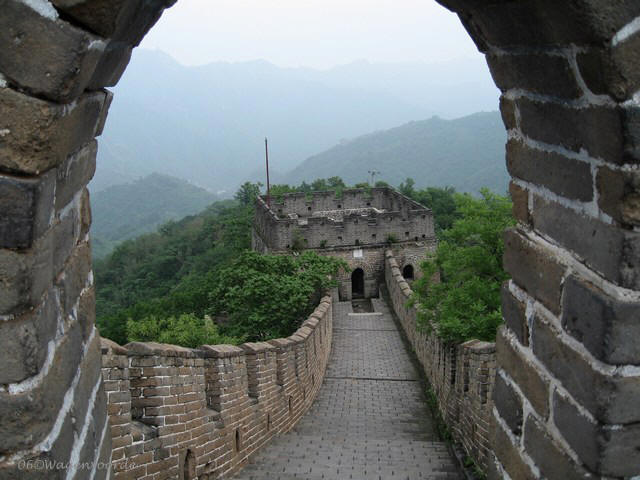
Using goats to
transport bricks
(The Great
Wall)
In 1607, the
35th year of Wanli Emperor's reign, a battalion of imperial
troops stationed in the Mount Damaoshan area wasdered to upgrade
the surface of the Wall between watchtowers No. 89 and No. 90 at
Chengziyu by the addition of bricks. Such a task was nothing new
for the soldiers, who had taken part in Wall building in many
other places elsewhere within the Jizhen Military Region.
However, transportation of building materials at Chengziyu was
more of a problem. The Wall was located high up on a precipitous
mountain, which was overgrown with shribs and brambles. Moreover,
the troops were pressed by a short deadline.
Fearing punishment if they failed to meet the deadline, the
commanders of the Damaoshan Garrison and the battalion jointly
put up a public notice, offering a reward of 300 taels of silver
to any person helping them resolve the problem. Days passed, but
no ideas were forthcoming.
Then one day a sheperd showed up, saying he would accept the
challenge. The young man came from Ruzhou, a mountainous area
neighboring Chengziyu, and he happened to see the notice while
attending a local temple fair dedicated to a goddesss said to be
able to grant childless couples the birth of a baby.
Seeing the notice on the wall, so goes the tale, the young man
asked the soldier guarding it whether the army officers really
meant what they said. The reply was: 'There's no jesting in the
performance of any military duty!'
The shepherd lost no time to meet the commanders, and signed a
pledge to transport building materials up the mountain, under
which he would be executed if he failed to accomplish the task.
It turned out that he had a herd of 150 goats dubbed 'horse
goats' which were as sure-footed as goats and as swift as horses.
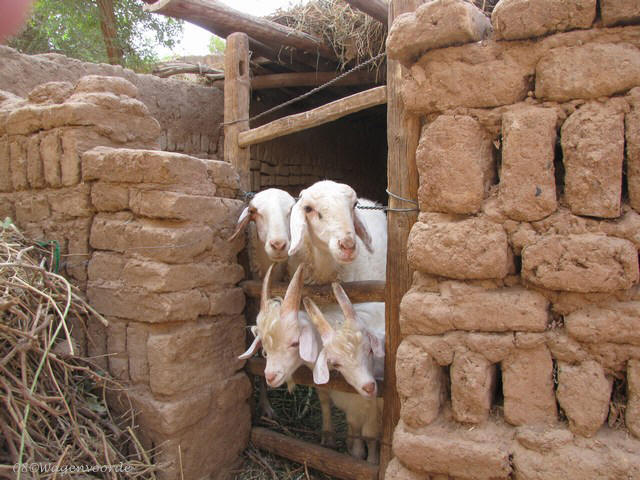
The animals were indeed helpful, each of them carrying two
bricks at a time to the worksite at the top of the mountain.
They were driven up with bricks on their backs three times in
the morning, and would rest in the afternoon. However, before
long the shepherd became distressed and met the commander pf the
Chengziyu Garrison. 'Something strange is happening, 'he
reported. 'It seems my goats are slowly disappearing, one goes
missing every other day.'
The general flew into a rage, suspecting a thief was among his
men. 'Where's the son-of-a-bitch who's stealing these animals?'
he yelled to his assembled troops. 'Step forward if you're the
man!' Nobody answered his call. The men, bewildered, just looked
at one another.
The shepherd was to find out that the predator was a python
whose body was as thick as a water bucket. Living in a hollow
just below the worksite it would emerge every other day to
attack its easy prey: a goat handicapped by the weight of two
Great Wall bricks.
The next day, however, the python became the prey as the
garrison commander dispatched a squad of his best soldiers to
hunt down and kill the python. It is said that during the hunt a
huge thunderstorm broke out and the puthon was miraculously
struck dead by a bolt of lioghtning. Afterwards, construction
resumed.
The wall in between the two watchtowers, 60 zhang and six chi
long, was completed on schedule. Some 80 percent of the Wall has
been preserved to this day.
Zhang Heshan,
translated by Li Zhurun
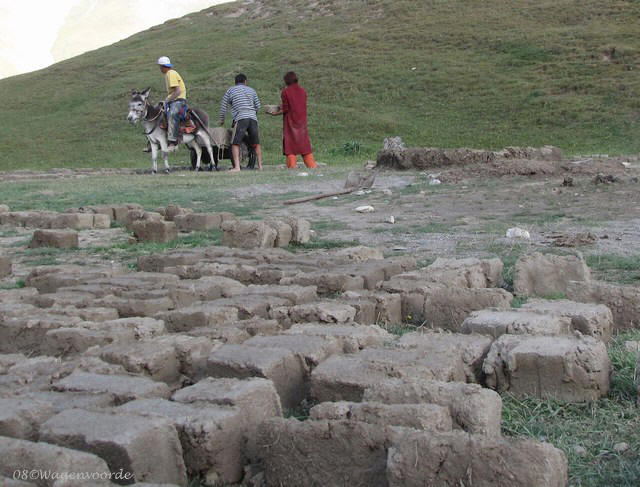
-------------------------------------------------------------------------------------------------------------------
up
----------------------------------------------------- |
Controlling a flood by blocking a river
The Great Wall of China
Her husband's mistress
Nearly said
The old dame by the Fenshui River
The story of the dog
Using goats to transport bricks
The Yanyu Hern and the Greedy Dragon
|

![]() Dutch
Dutch



 Then
it was another May, when the earth was covered with pomegranate blossoms
again. Our old wounds had just healed, but we ran into eachother again.
You whispered to me when nobody was around:"Everything's been
pre-arranged. I never knew I should marry him." Didn't your words spoil
the scenery? "What do you mean?", I asked. You looked down, lost in
thought for a moment. Instead of answering me, you gave a sad smile and
tripped away, leaving behind a lifetime mystery.
Then
it was another May, when the earth was covered with pomegranate blossoms
again. Our old wounds had just healed, but we ran into eachother again.
You whispered to me when nobody was around:"Everything's been
pre-arranged. I never knew I should marry him." Didn't your words spoil
the scenery? "What do you mean?", I asked. You looked down, lost in
thought for a moment. Instead of answering me, you gave a sad smile and
tripped away, leaving behind a lifetime mystery.


